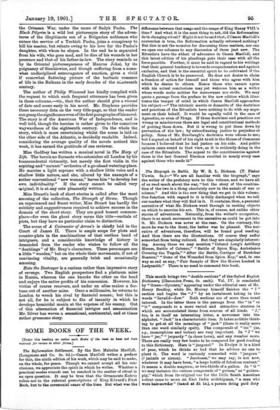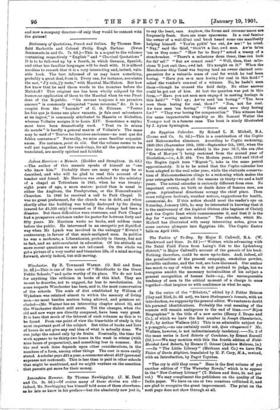This month brings two "double sections" of the Oxford English
Dictionary (Clarendon Press, 6s. each). Vol. IV. is concluded by " Green—Gyzzarn," appearing under the editorial care of Mr. Henry Bradley, while Dr. Murray himself finishes the " I " section and begins the "3" by an instalment taking in the words "Invalid—Jew." Both sections are of more than usual interest. In the latter there is the passage from the " in " or " ir" compounds to a more varied and attractive stratum in which are accumulated items from sources of all kinds. "3," too, is in itself an interesting letter, a newcomer into the alphabet. "Jack" is a characteristic item. It takes no little think- ing to get at all the meanings of " jack " (there is really more than one word similarly spelt). The compounds of " iso " (as, e.g., isomorphism and isobar) are very important. In "3" we have" jar," " jeopardy " (a chess term), and any number more. There are really very few books to be compared for good reading to this dictionary. Here is " jargonel." In Evelyn it is a kind of pear, which he thinks so bad that he advises no one to plant it. The word is curiously connected with " jargoon " (? jacinth or zircon). "Jeroboam," we may say, is not now, whatever it may have been, "a large bottle of fabulous content." It means a double magnum, or two-thirds of a gallon. In " G " we may instance the curious compounds of" guinea," as "guinea- pig," which from its original use for the little South American rodent came to mean an East India midshipman, " a man who wore hair-Dowder " (taxed at 21 is.), a parson doing paid duty
and now a company director—if only they would be content with the guinea!







































 Previous page
Previous page